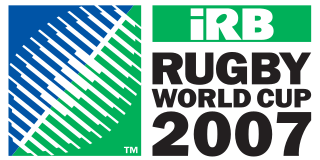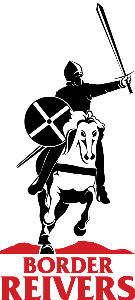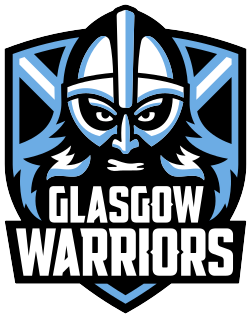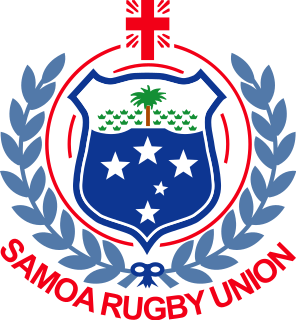Related Research Articles

The 2007 Rugby World Cup was the sixth Rugby World Cup, a quadrennial international rugby union competition inaugurated in 1987. Twenty nations competed for the Webb Ellis Cup in the tournament, which was hosted by France from 7 September to 20 October. France won the hosting rights in 2003, beating a bid from England. The competition consisted of 48 matches over 44 days; 42 matches were played in ten cities throughout France, as well as four in Cardiff, Wales, and two in Edinburgh, Scotland.

The Scotland national rugby union team represents Scotland in men's international rugby union and is administered by the Scottish Rugby Union. The team takes part in the annual Six Nations Championship and participates in the Rugby World Cup, which takes place every four years.
The 1991 Rugby World Cup was the second edition of the Rugby World Cup, and was jointly hosted by England, Scotland, Wales, Ireland and France: at the time, the five European countries who participated in the Five Nations Championship. This was the first Rugby World Cup to be staged in the northern hemisphere, with England the hosts of the final. Also for the first time, qualifying competitions were introduced as the number of entrants had increased from 16 nations four years before to a total of 33 countries. The eight quarter-finalists from 1987 qualified automatically with the remaining eight spots contested through qualifiers by 25 countries. This resulted in only one new side qualifying for the tournament, Western Samoa replacing Tonga. The same 16-team pool/knock-out format was used with just minor changes to the points system. South Africa was again not included because of sanctions imposed on the country by the IRB, due to the government's apartheid policies.

Border Reivers, originally known as Scottish Borders Rugby, and also known as The Borders, were one of four professional rugby union teams in Scotland, alongside Edinburgh, Caledonia Reds and Glasgow Warriors.

Glasgow Warriors are one of the two professional rugby union sides from Scotland. The team plays in the United Rugby Championship league and in the European Professional Club Rugby tournaments. In the 2014–15 season they won the Pro12 title and became the first Scottish team to win a major trophy in rugby union's professional era. The side is known for its fast, dynamic and attacking style of play, using offloads and quick rucks. Defensively the club prides itself on its 'Fortress Scotstoun' where the club play at home.

The Samoa national rugby union team represents Samoa in men's international rugby union and it is governed by the Samoa Rugby Union. They are also known as Manu Samoa, which is thought to derive from the name of a Samoan warrior. They perform a traditional Samoan challenge called the siva tau before each game. Samoa Rugby Union were formerly members of the Pacific Islands Rugby Alliance (PIRA) along with Fiji and Tonga. They are ranked 12th in the world.

The Fiji national rugby union team represents Fiji in men's international rugby union competes every four years at the Rugby World Cup, and their best performances were the 1987 and 2007 tournaments when they defeated Argentina and Wales respectively to reach the quarterfinals. Fiji also regularly plays test matches during the June and November test windows. Fiji also plays in the Pacific Tri-Nations, and has won the most Pacific Tri-Nations Championships of the three participating teams.

Murrayfield Stadium is a Rugby stadium located in the Murrayfield area of Edinburgh, Scotland. It has a seating capacity of 67,144 making it the largest stadium in Scotland and the fifth largest in the United Kingdom.
Ayr Rugby Football Club is a rugby union club. Its top men's side currently plays as Ayrshire Bulls in the Super 6 competition; and its women's side play in the Scottish Womens National One. The club also runs a "Club XV" which competes in the Tennent's National League 1, a 2nd XV "Ayr-Millbrae", which plays in the SRU West Reserve League Division 1, and various age group teams, from age 4, up to age 18.

Steve Walsh is a retired professional rugby union referee from New Zealand. He officiated at international level from 1998 to 2014, and at three Rugby World Cups, including refereeing the semi-final between South Africa and Argentina in 2007. Walsh became the most experienced Super Rugby referee in 2014, passing Jonathan Kaplan's record before retiring from the game in 2015.

Jonathan Isaac Kaplan, is a former international rugby union referee who used to hold the record for the most international matches as referee.

Rugby union in Scotland in its modern form has existed since the mid-19th century. As with the history of rugby union itself however, it emerged from older traditional forms of football which preceded the codification of the sport. In the same manner as rugby union in England, rugby union in Scotland would grow at a significant rate to the point where Scotland played England in the first ever rugby union international in 1871, a match which was won by the Scottish team.

The Rugby World Cup is a rugby union tournament held every four years and contested by the men's national teams of the member unions of World Rugby. The Wales national rugby union team has participated in all nine Rugby World Cup tournaments. Up to and including 2015, hosting of the tournament alternated between traditional rugby heartlands in the southern hemisphere and those in Europe. Wales was the primary host in 1999, with Cardiff's Millennium Stadium built to coincide with the event, and the other three tournaments played in Europe have also used venues in Wales to some degree. Cardiff's Millennium Stadium and its predecessor, the Cardiff Arms Park, will have hosted a total 21 matches over a total of four World Cups. This is the largest number of World Cup games hosted by one venue.
George Clancy is an Irish rugby union referee. Clancy refereed at the 2011 and 2015 Rugby World Cups. He has also refereed in the Pro14, the European Rugby Champions Cup, the Six Nations Championship and the Rugby Championship. Clancy refereed the 2007 Churchill Cup final and the 2009 and 2011 European Challenge Cup finals. Between 2013 and 2017 Clancy also served as a touch judge/assistant referee at five consecutive European Rugby Champions Cup finals.
James Mathieson Fleming MBE is a retired Scottish Rugby Union Referee who refereed 42 major international matches and was a touch judge in a further 75. The international matches that he controlled were between 1985 and 2001 and included matches in four Rugby World Cups.
Jérôme Garcès is a French rugby union referee who regularly officiates high-profile club matches in tournaments such as Pro14, Top 14 and the Heineken Cup.
The 1998–99 season is the third in the history of the Glasgow Warriors as a professional side. During this season the young professional side competed as Glasgow Caledonians.
Derek Turnbull is a former Scotland international rugby union player.
The Welsh–Scottish League was a rugby union league in Scotland and Wales jointly implemented by the Scottish Rugby Union and the Welsh Rugby Union from the 1999–2000 season onwards. It was a precursor to the Celtic League and lasted three seasons, being disbanded after the Celtic League was set up.
References
- 1 2 "Referees' panel of three just the limit. SRU are determined to challenge board's reduction from five". The Glasgow Herald . 3 December 1991. Retrieved 17 April 2022.
- ↑ Mclaren, Bill (19 January 1981). "Wales bolt English scrum for hair's-breadth win". The Glasgow Herald. p. 15. Retrieved 17 April 2022.
- ↑ "Scottish referee 'blew us out' says US coach". The Glasgow Herald. 1 June 1987. p. 9. Retrieved 17 April 2022.
- ↑ Lothian, Bill (13 October 2011). "Rugby: A whistle stop tour of memories for Brian". The Scotsman . Retrieved 17 April 2022.
- ↑ Woolford, Anthony (31 July 215). "The 20 best Rugby World Cup referees in history... but just where does Welsh number one Nigel Owens rank?". Wales Online . Retrieved 17 April 2022.
- ↑ "Scottish link to inaugural final". The Scotsman. 14 October 2011. Retrieved 17 April 2022.
- ↑ Gallagher, Brendan (7 November 2021). "Blanco breaks the line … and Wallaby hearts". www.therugbypaper.co.uk. Retrieved 17 April 2022.
- ↑ Cleaver, Dylan (14 August 2011). "1991: Campo's golden touch". The New Zealand Herald . Retrieved 17 April 2022.
- ↑ McMurtrie, Bill (2 December 1991). "Shock as top Scottish referee retires". The Glasgow Herald. Retrieved 17 April 2022.